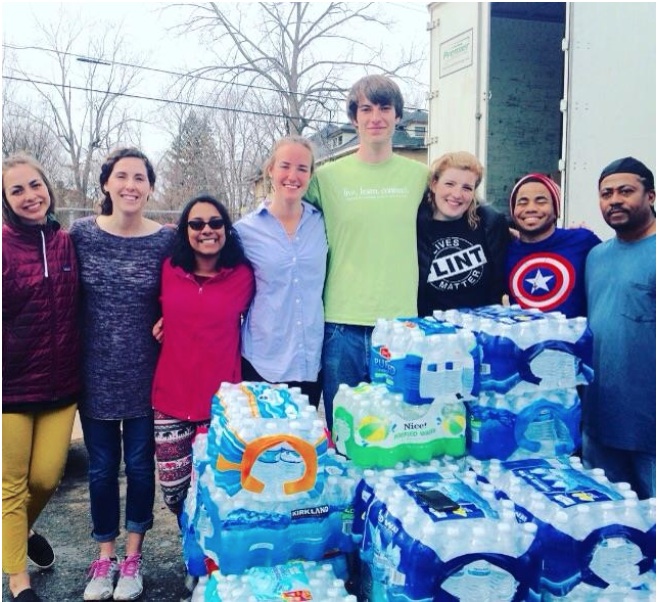When Hannah Vestal’s clean-water trip was cancelled, she was disappointed. But she quickly realized that her team of six students had the opportunity to make an impact domestically with a water crisis happening just a few states away. In Flint, Michigan, the drinking water has been contaminated with lead and remains to be a debilitating hurdle for its inhabitants. Vestal spent five days there and found people in great despair, but also, people with great hope.
The team arrived in Flint on March 6 to begin their photo documentary titled, “Faces of Flint,” which is aimed to tell a different story than what is portrayed by mainstream media.
“Our idea was to go and talk to some of the residents of Flint and ask questions and get to know them and what they have to say. The media portrays a lot of politics and numbers and facts and figures, but there’s a human side of it that doesn’t get shown,” said Vestal. The senior psychology student has also raised $10,313 for the people of Belize and Panama through her initiative Billikens for Clean Water, which she founded in 2014.
Vestal and her photographer, Abigail Knight, set out in Flint with a very clear mission statement: “Revealing the water crisis through a personal lens by hearing the stories and capturing photographs of the faces of Flint. Our photography is not a vehicle for our own voices to travel, but to amplify the voices of the people of Flint themselves. In the words of Mev Puleo, ‘Images can make present what is absent and invite us to speak with, not just for, others.’”
The pair spent their days volunteering to deliver water to residents while getting to know those people and their stories, as well. At first, Vestal felt uneasy about prying into the lives of these strangers, who she said were already going through such hardships.
“I didn’t know what a water crisis would look like here in America. I’ve only seen it in other countries,” Vestal said. “I didn’t know how to approach it. We took it one day at a time, and by the last day it came so naturally. They were so open about talking to us. They would just go right into it and say how their lives have been affected by the crisis.”
The group spoke to students at the University of Michigan campus in Flint, a barista at a local café and several families they delivered water to. But one story that stuck out, and was particularly eye opening for Vestal about how much life revolves around water, was from a father of four. He talked about the struggle of taking care of his kids and doing the everyday things that are now arduous tasks.
He’s quoted on the project’s website, saying, “My family’s been affected terribly by the water crisis, man, we can’t take baths. I got four children, all of them toddlers, babies, so I gotta be real careful about how I cook foods. How I wash her bottles out. Who can I trust? I’m scared. What is the purpose of this, why are they trying to cover this up for? They’ll give us water for free but still some families ain’t got cars to come get it, got enough cases to take care of their entire family.”
This family’s story was similar to many others in Flint. They delivered water filters door-to-door on their last day, which Vestal says was the most impactful experience of the trip.
“For some people it was their first time getting a filter, which means they’ve been drinking dirty water this whole time,” Vestal said. “It was a rude awakening for me of my privilege because if a water crisis happened where I live I know my mom would have us move, but these people can’t move because they don’t have the money to do that. It was really hard to see these people stuck in this situation.”
While all of the interviews revealed a lot of struggle for the residents of Flint, Vestal said that the interviews also revealed that these people still had a sense of community and hope for the future.
“We did end up capturing this other side to the water crisis that is not portrayed in the media and that’s this side of the strong community that still has a lot of hope,” said Vestal. “There were people that would talk about the struggles that they go through and then when I’d ask them about Flint and their home, they lit up because of the way that everybody has really been there for each other.”
By the end of the trip, Vestal knew her work in Flint was not over. She and Knight will return to the city this summer to capture more stories from the people, with the intention to compile the stories into a book.
Through “Faces of Flint,” Vestal said she hopes people will see how important it is to just be there for people. “Sometimes we hear about injustices and we want to do something but we don’t know what do, and I didn’t really know what to do but I decided I was just going to show up,” Vestal said. “Sometimes we think we have to do more than that or come up with a solution, but honestly just going there and willing to be vulnerable with these people is enough.”
Although Vestal came away with many lessons and experiences from her time in Flint, her message remained singular: “I’d say there’s a lot of hurt and anger there, but there’s also a lot of strength and hope, and that’s the main message that I want people to get from this.”






